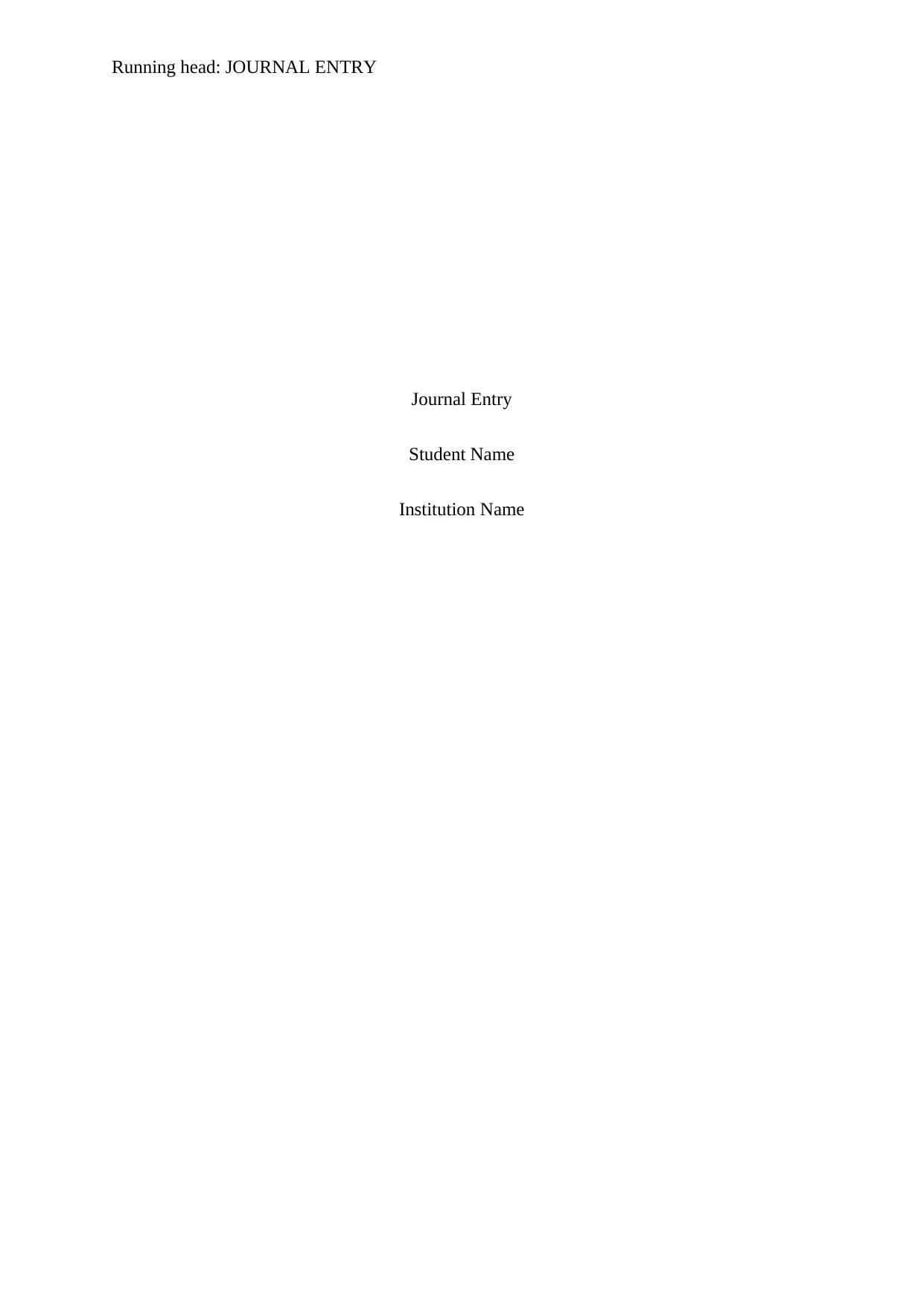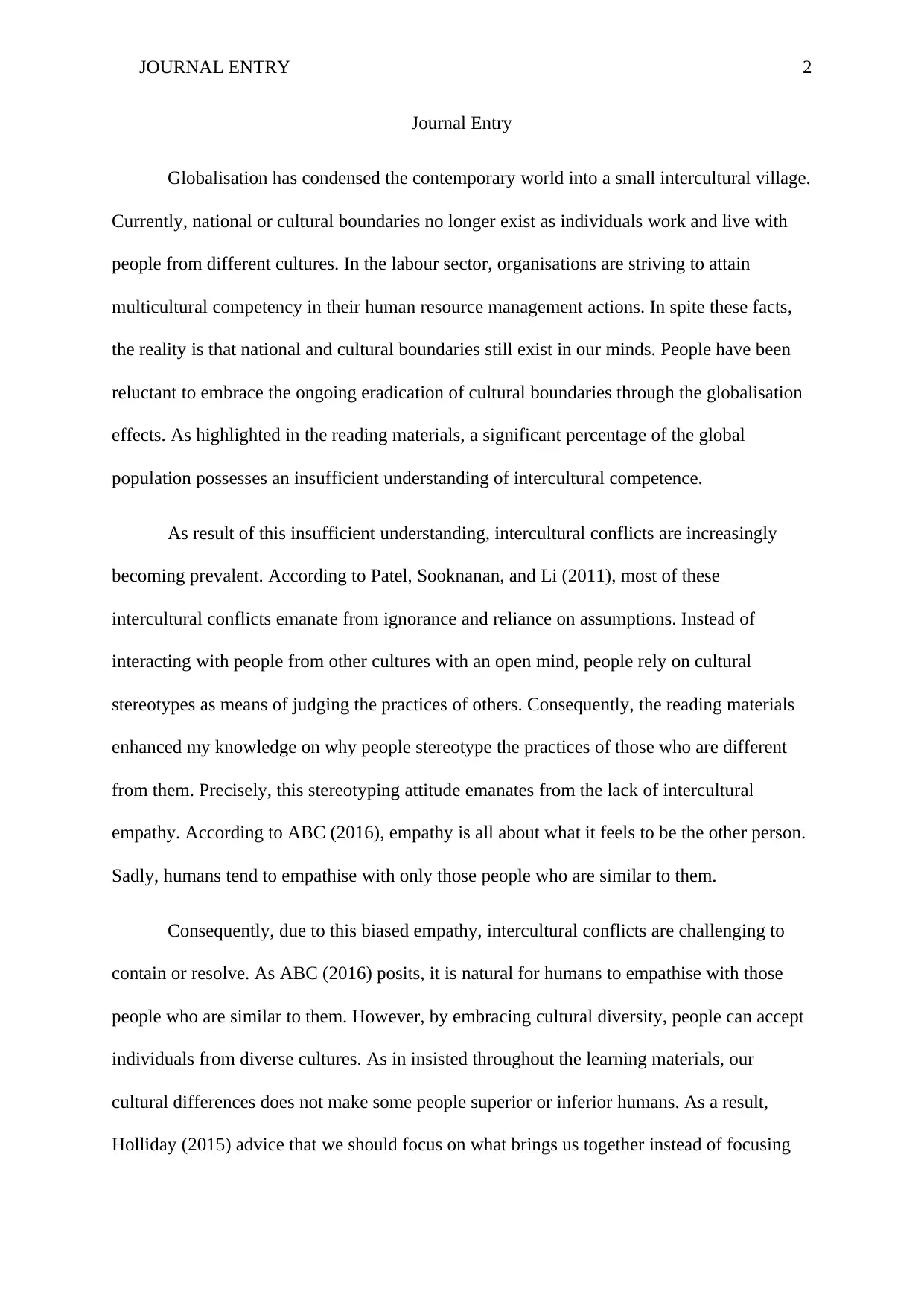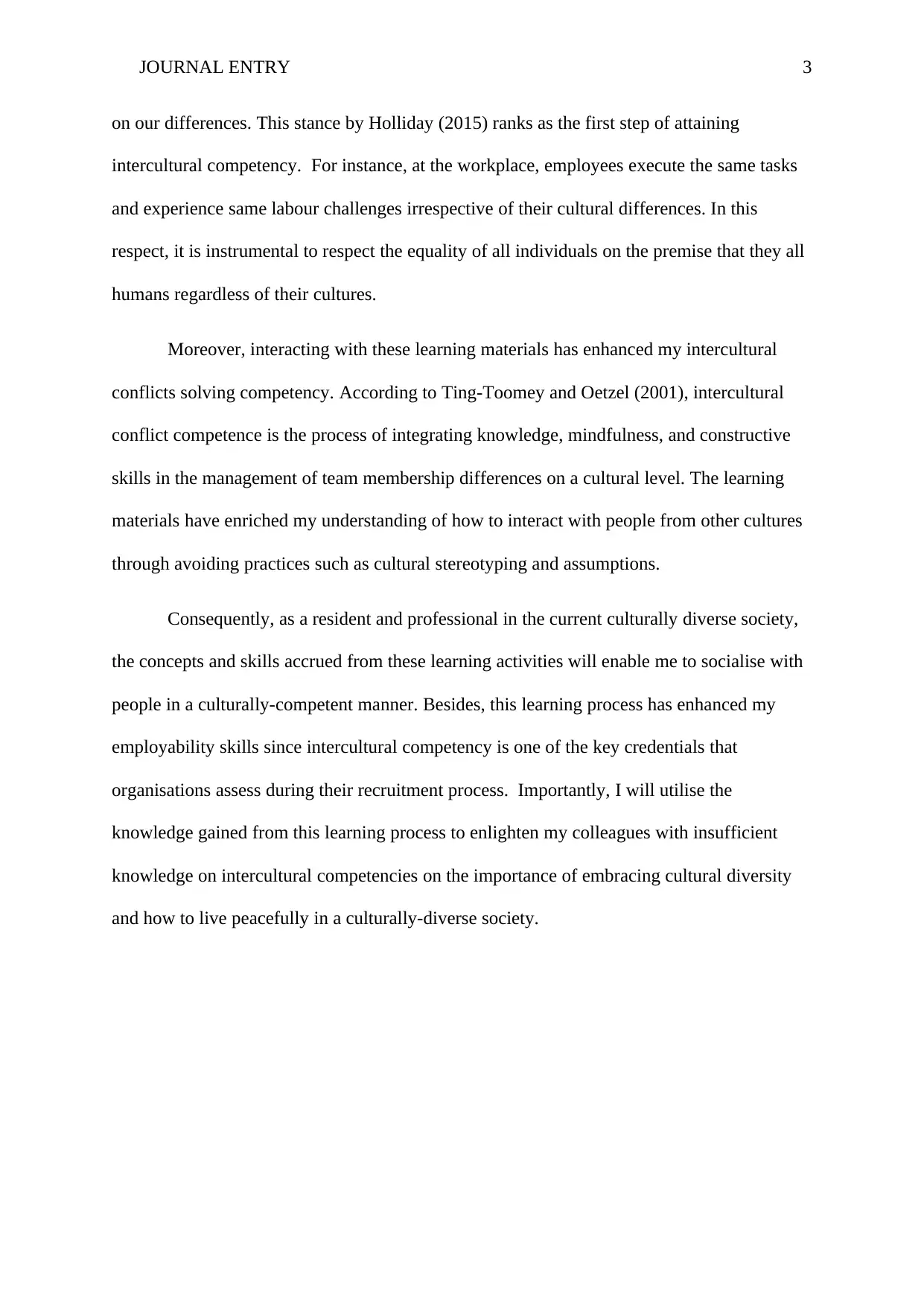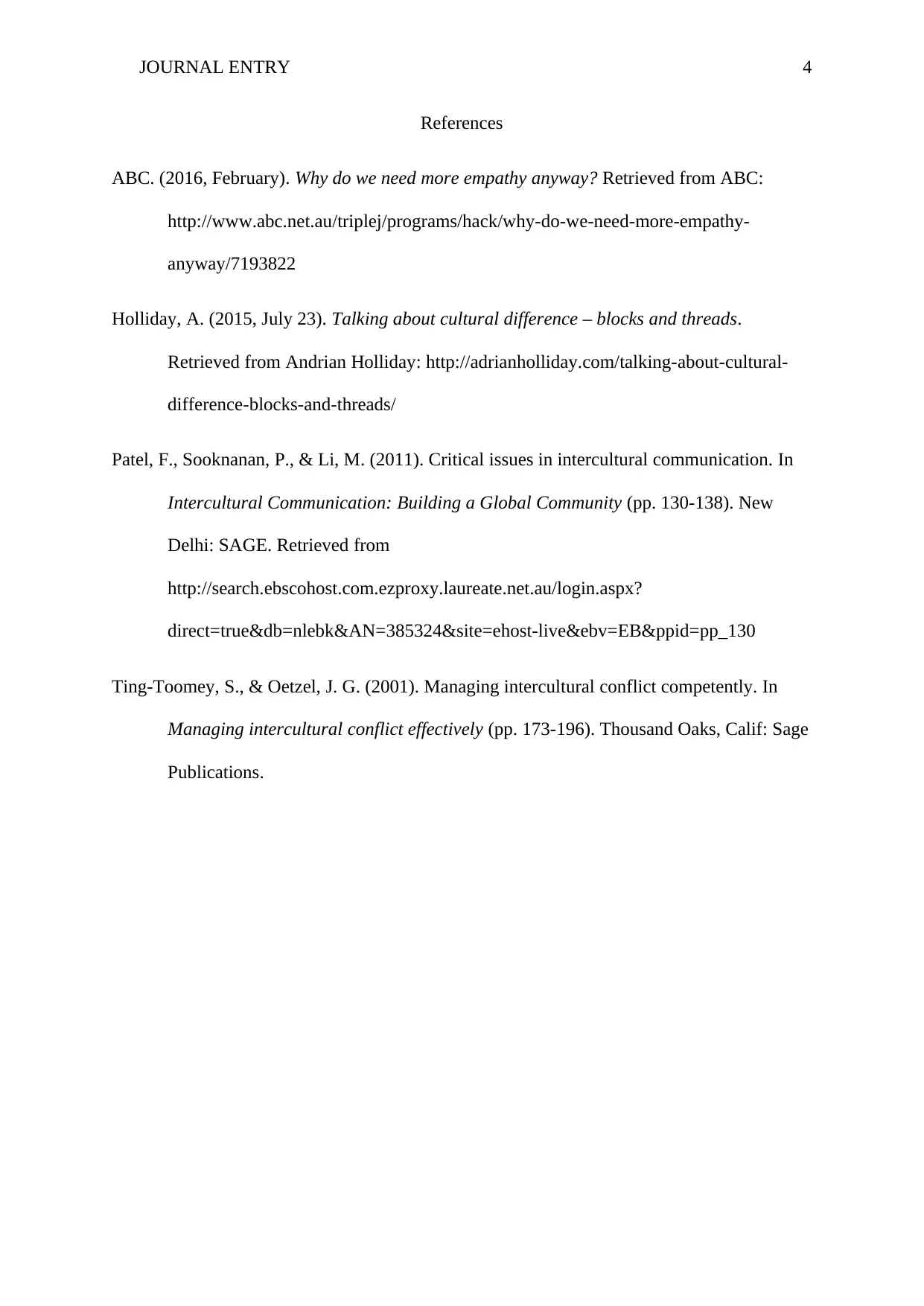COMR2010 Reflective Journal: Cultural Diversity and Competence
VerifiedAdded on 2023/06/13
|4
|760
|490
Journal and Reflective Writing
AI Summary
This reflective journal entry explores the impact of globalization on cultural boundaries and the importance of intercultural competence. It highlights the prevalence of intercultural conflicts stemming from ignorance and reliance on stereotypes, emphasizing the role of empathy in bridging cultural divides. The journal reflects on the need to focus on shared human experiences rather than cultural differences to foster inclusivity and respect. It also discusses the integration of knowledge, mindfulness, and constructive skills for effective intercultural conflict management, enhancing both personal and professional interactions in a culturally diverse society. The student aims to apply these insights to promote cultural diversity and understanding among colleagues.

Running head: JOURNAL ENTRY
Journal Entry
Student Name
Institution Name
Journal Entry
Student Name
Institution Name
Paraphrase This Document
Need a fresh take? Get an instant paraphrase of this document with our AI Paraphraser

JOURNAL ENTRY 2
Journal Entry
Globalisation has condensed the contemporary world into a small intercultural village.
Currently, national or cultural boundaries no longer exist as individuals work and live with
people from different cultures. In the labour sector, organisations are striving to attain
multicultural competency in their human resource management actions. In spite these facts,
the reality is that national and cultural boundaries still exist in our minds. People have been
reluctant to embrace the ongoing eradication of cultural boundaries through the globalisation
effects. As highlighted in the reading materials, a significant percentage of the global
population possesses an insufficient understanding of intercultural competence.
As result of this insufficient understanding, intercultural conflicts are increasingly
becoming prevalent. According to Patel, Sooknanan, and Li (2011), most of these
intercultural conflicts emanate from ignorance and reliance on assumptions. Instead of
interacting with people from other cultures with an open mind, people rely on cultural
stereotypes as means of judging the practices of others. Consequently, the reading materials
enhanced my knowledge on why people stereotype the practices of those who are different
from them. Precisely, this stereotyping attitude emanates from the lack of intercultural
empathy. According to ABC (2016), empathy is all about what it feels to be the other person.
Sadly, humans tend to empathise with only those people who are similar to them.
Consequently, due to this biased empathy, intercultural conflicts are challenging to
contain or resolve. As ABC (2016) posits, it is natural for humans to empathise with those
people who are similar to them. However, by embracing cultural diversity, people can accept
individuals from diverse cultures. As in insisted throughout the learning materials, our
cultural differences does not make some people superior or inferior humans. As a result,
Holliday (2015) advice that we should focus on what brings us together instead of focusing
Journal Entry
Globalisation has condensed the contemporary world into a small intercultural village.
Currently, national or cultural boundaries no longer exist as individuals work and live with
people from different cultures. In the labour sector, organisations are striving to attain
multicultural competency in their human resource management actions. In spite these facts,
the reality is that national and cultural boundaries still exist in our minds. People have been
reluctant to embrace the ongoing eradication of cultural boundaries through the globalisation
effects. As highlighted in the reading materials, a significant percentage of the global
population possesses an insufficient understanding of intercultural competence.
As result of this insufficient understanding, intercultural conflicts are increasingly
becoming prevalent. According to Patel, Sooknanan, and Li (2011), most of these
intercultural conflicts emanate from ignorance and reliance on assumptions. Instead of
interacting with people from other cultures with an open mind, people rely on cultural
stereotypes as means of judging the practices of others. Consequently, the reading materials
enhanced my knowledge on why people stereotype the practices of those who are different
from them. Precisely, this stereotyping attitude emanates from the lack of intercultural
empathy. According to ABC (2016), empathy is all about what it feels to be the other person.
Sadly, humans tend to empathise with only those people who are similar to them.
Consequently, due to this biased empathy, intercultural conflicts are challenging to
contain or resolve. As ABC (2016) posits, it is natural for humans to empathise with those
people who are similar to them. However, by embracing cultural diversity, people can accept
individuals from diverse cultures. As in insisted throughout the learning materials, our
cultural differences does not make some people superior or inferior humans. As a result,
Holliday (2015) advice that we should focus on what brings us together instead of focusing

JOURNAL ENTRY 3
on our differences. This stance by Holliday (2015) ranks as the first step of attaining
intercultural competency. For instance, at the workplace, employees execute the same tasks
and experience same labour challenges irrespective of their cultural differences. In this
respect, it is instrumental to respect the equality of all individuals on the premise that they all
humans regardless of their cultures.
Moreover, interacting with these learning materials has enhanced my intercultural
conflicts solving competency. According to Ting-Toomey and Oetzel (2001), intercultural
conflict competence is the process of integrating knowledge, mindfulness, and constructive
skills in the management of team membership differences on a cultural level. The learning
materials have enriched my understanding of how to interact with people from other cultures
through avoiding practices such as cultural stereotyping and assumptions.
Consequently, as a resident and professional in the current culturally diverse society,
the concepts and skills accrued from these learning activities will enable me to socialise with
people in a culturally-competent manner. Besides, this learning process has enhanced my
employability skills since intercultural competency is one of the key credentials that
organisations assess during their recruitment process. Importantly, I will utilise the
knowledge gained from this learning process to enlighten my colleagues with insufficient
knowledge on intercultural competencies on the importance of embracing cultural diversity
and how to live peacefully in a culturally-diverse society.
on our differences. This stance by Holliday (2015) ranks as the first step of attaining
intercultural competency. For instance, at the workplace, employees execute the same tasks
and experience same labour challenges irrespective of their cultural differences. In this
respect, it is instrumental to respect the equality of all individuals on the premise that they all
humans regardless of their cultures.
Moreover, interacting with these learning materials has enhanced my intercultural
conflicts solving competency. According to Ting-Toomey and Oetzel (2001), intercultural
conflict competence is the process of integrating knowledge, mindfulness, and constructive
skills in the management of team membership differences on a cultural level. The learning
materials have enriched my understanding of how to interact with people from other cultures
through avoiding practices such as cultural stereotyping and assumptions.
Consequently, as a resident and professional in the current culturally diverse society,
the concepts and skills accrued from these learning activities will enable me to socialise with
people in a culturally-competent manner. Besides, this learning process has enhanced my
employability skills since intercultural competency is one of the key credentials that
organisations assess during their recruitment process. Importantly, I will utilise the
knowledge gained from this learning process to enlighten my colleagues with insufficient
knowledge on intercultural competencies on the importance of embracing cultural diversity
and how to live peacefully in a culturally-diverse society.
⊘ This is a preview!⊘
Do you want full access?
Subscribe today to unlock all pages.

Trusted by 1+ million students worldwide

JOURNAL ENTRY 4
References
ABC. (2016, February). Why do we need more empathy anyway? Retrieved from ABC:
http://www.abc.net.au/triplej/programs/hack/why-do-we-need-more-empathy-
anyway/7193822
Holliday, A. (2015, July 23). Talking about cultural difference – blocks and threads.
Retrieved from Andrian Holliday: http://adrianholliday.com/talking-about-cultural-
difference-blocks-and-threads/
Patel, F., Sooknanan, P., & Li, M. (2011). Critical issues in intercultural communication. In
Intercultural Communication: Building a Global Community (pp. 130-138). New
Delhi: SAGE. Retrieved from
http://search.ebscohost.com.ezproxy.laureate.net.au/login.aspx?
direct=true&db=nlebk&AN=385324&site=ehost-live&ebv=EB&ppid=pp_130
Ting-Toomey, S., & Oetzel, J. G. (2001). Managing intercultural conflict competently. In
Managing intercultural conflict effectively (pp. 173-196). Thousand Oaks, Calif: Sage
Publications.
References
ABC. (2016, February). Why do we need more empathy anyway? Retrieved from ABC:
http://www.abc.net.au/triplej/programs/hack/why-do-we-need-more-empathy-
anyway/7193822
Holliday, A. (2015, July 23). Talking about cultural difference – blocks and threads.
Retrieved from Andrian Holliday: http://adrianholliday.com/talking-about-cultural-
difference-blocks-and-threads/
Patel, F., Sooknanan, P., & Li, M. (2011). Critical issues in intercultural communication. In
Intercultural Communication: Building a Global Community (pp. 130-138). New
Delhi: SAGE. Retrieved from
http://search.ebscohost.com.ezproxy.laureate.net.au/login.aspx?
direct=true&db=nlebk&AN=385324&site=ehost-live&ebv=EB&ppid=pp_130
Ting-Toomey, S., & Oetzel, J. G. (2001). Managing intercultural conflict competently. In
Managing intercultural conflict effectively (pp. 173-196). Thousand Oaks, Calif: Sage
Publications.
1 out of 4
Your All-in-One AI-Powered Toolkit for Academic Success.
+13062052269
info@desklib.com
Available 24*7 on WhatsApp / Email
![[object Object]](/_next/static/media/star-bottom.7253800d.svg)
Unlock your academic potential
Copyright © 2020–2026 A2Z Services. All Rights Reserved. Developed and managed by ZUCOL.


